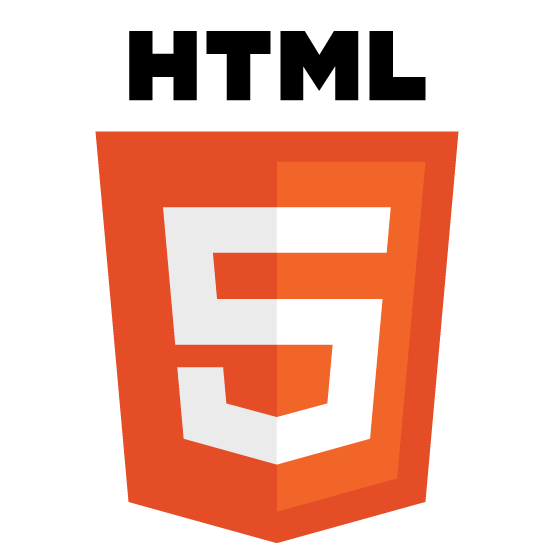Open Oakland Water Quality Project
Massive underlying problem
Approximately one million California residents currently only have access to drinking water that does not meet state and federal standards. When we started the Water Quality project most of the team members weren’t aware of the scope of the problem. The number of Californians whose tap water is currently delivering unsafe levels of dangerous carcinogens like arsenic was shocking.
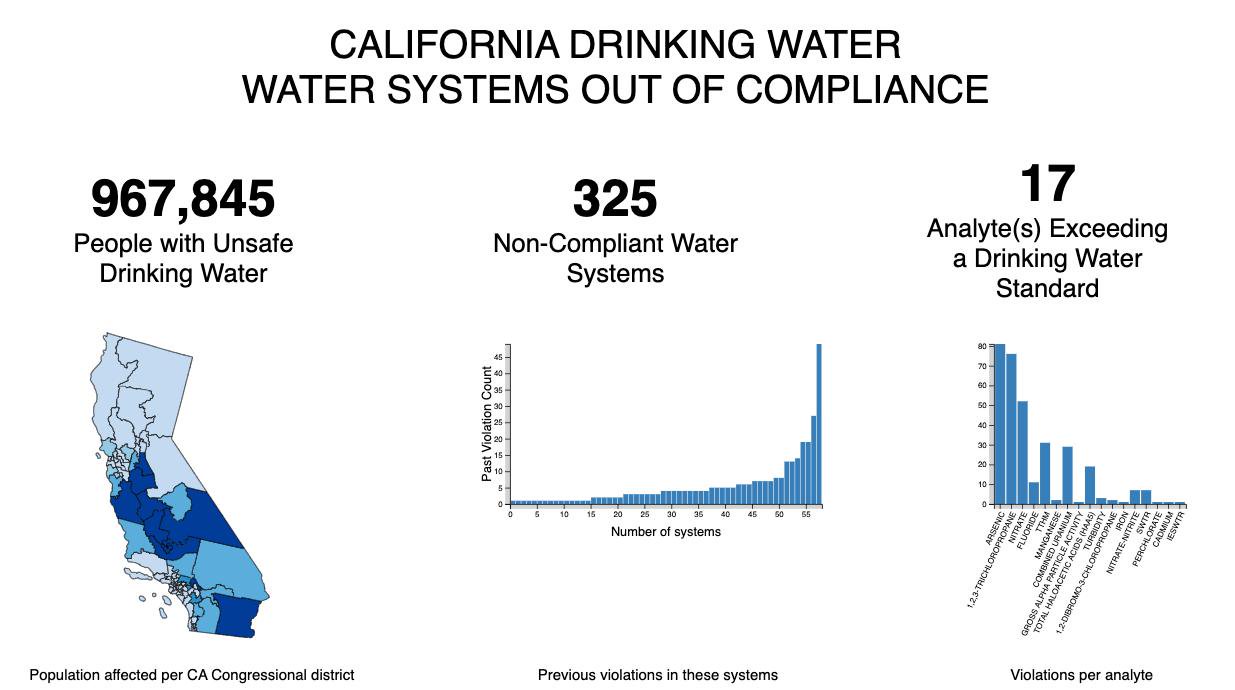
Organizational Collaboration
Civic tech projects have a much better chance of being helpful to the community when they work closely with subject matter experts who have been dealing with the issue for years. The Open Oakland Water Quality project is a collaboration between veteran community water quality activists, government water experts and Open Oakland’s volunteers.
Community Activists

The non profit activist group: The Community Water Center are intimately aware of the scope of water quality issues and the fact that they are more prevalent in lower income communities. The Community Water Center have been effectively advocating for cleaner water for Californians since 2006.
Rucker Alex is the Open Oakland Water Quality project subject matter expert. Her expertise, vision and relationship with both government and activist stakeholders are the heart of this project. She translated the needs of the activist group into actionable plans, organized feedback sessions with the CWC and made sure the team's work helped achieve our partner's goals.
The CWC initially wanted help running some transformations on the data from the Water Board. They had been using a VBscript that stopped working after a dataset modification. We performed this task initially with a glitch application and then started working with them on a larger project where we could mine the data and create visualizations to help identify the communities most in need and to help the CWC communicate the scope of the issue to lawmakers. The CWC were concerned specifically with which communities have been stuck with unsafe water for the longest, which systems had the most acute contamination problems.
Code for America Brigade Volunteers

The Open Oakland Code for America brigade is a dynamic group of people interested in making volunteer contributions to civic tech projects. There are several projects underway at any time. The Open Oakland crew gets a constant stream of new members and is really smooth at welcoming new people. If you have any interest in contributing to a civic tech project(no technical expertise is required, projects need help in many areas including design, community outreach and project management) stop by Tuesday night at Oakland City Hall. One of the most rewarding parts of working on this project has been meeting so many people interested in volunteering to improve their community.
State Government
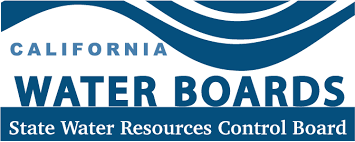
The CA State Water Board is the source of the underlying water testing dataset made available after the Human Right to Water Bill was signed. CA State Water board employees have been extremely generous with their time and expertise, helping our team get access to revised datasets, explaining nuances of measurements and water system citations, and providing insightful, direct feedback on what we built.
CA Water Data Challenge

The Open Oakland Water Quality project began at the Summer 2018 CA Water Data Challenge kickoff event in San Francisco. The Water Data Challenge organizing team puts on several events every year where contributing teams can get feedback from government and private water and data science experts. This results in a lot of helpful feedback for government agencies making data available and a ton of insightful projects based on the data.
Project focus
We focused on identifying and meeting the needs of the CWC activists as the main users of the tools we built. Their needs focused on being able to quickly identify which communities had been dealing with unsafe water for the longest period of time, where the analyte levels where the worst, and being able to review the history of contamination in order to pintpoint areas which may not currently be in violation but had been out of compliance for a long time in the past or might often slide back and forth over the safe line.
We processed the data and created several visualizations and navigation tools in order to help them review:
-
Sliceable aggregate data by the entire state, county, city, CA Congressional District, CA Senate District or by Analyte

- Ability to drill down to the whole history of a specific system.

- And a map with a time slider that calculates the consecutive months each system stayed out of compliance
-
We also brainstormed new tools like the Congressional leaderboard which shows which CA Congress members have the most constituents currently without access to clean water

-
We built a reusable web component to display vertical 3D bars on mapbox WebGL maps to represent the acuteness of analyte measurements.
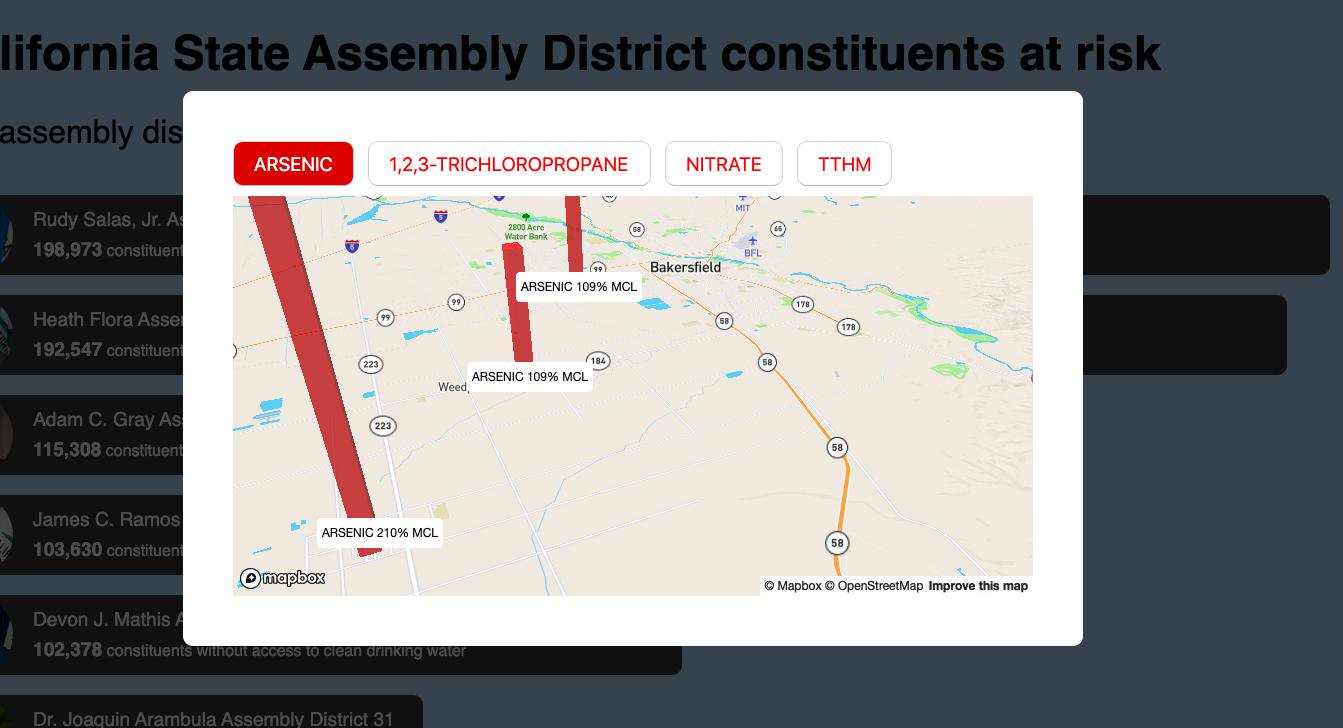
Individuals
Professional data scientist Cori Gaul used her extensive experience creating data dashboards to effortlessly show us how to effectively present our data driven insights. We are still working towards her final vision but what we’ve implemented so far has made our website much more useful.
Both Cori and Michael Norelli have been part of the project for several months, are really good at onboarding new volunteers and taking charge of presenting project updates to the whole brigade.
Michael Norelli’s enthusiasm for data powered mapping tools is infectious. His eyes light up when discussing new possibilities in the area and his fluency in whipping up the exact kind of geojson needed for a particular tool has been central to the project.
People often visit Open Oakland looking for something to work on that will help them sharpen new skills. Alex Aruj has taken on several key web development pieces, closing many issues making flawless contributions. One of my favorite collaborations was adding the D3 powered map of CA showing the Congressional Districts color coded by the number of people without access to clean water. We added this feature at Cori’s suggestion, Michael created the required geojson, Alex prototyped the D3 map, Aaron integrated it and then Sean Pennino identified and implemented a slick performance improvement.
It is a pleasure when experienced developers drop into a project and quickly help propel it forward. Sean Pennino is a great example of this, he has a lot of experience but doesn’t push any particular development approach, he quickly started making helpful commits, and got familiar with web components in order to seamlessly add more reusable widgets.
Skilled Visual designers Tristan Hoffman and Anita Tung were really helpful, creating designs that worked with and improved our dataviz and providing guidance to improve the look and feel of the site(We haven’t implemented all their suggestions yet so the version of the site today isn’t fully reflective of their input).
We’ve met a ton of other people on Tuesday nights at Open Oakland, folks whose code, guidance, creativity and encouragement are helping to push the project forward include Robert Gibboni, Dasun Wang, Oliver Croomes, Andrew Levy, Troy Tompkins, Diana Yitbarek, Justin Shih, Yotam Hacohen, Alissa Rubin and Ajay Anand
Open Oakland leadership has also been critically important in helping this project mature. Alison Lawyer, Tom Dooner and Colin King-Bailey helped us become an official brigade project with our own subdomain water.openoakland.org, helped us make contacts with helpful folks outside the brigade, promoted our project to potential volunteers and are constantly guiding all brigade projects, helping them improve common operations like new member onboarding.
Ariel Chavez and Wendy Killou at the CA State Water Control Board were very generous, explaining nuances of the testing datasets and providing feedback on the tools the team produced. The Community Water Center activists were the original impetus for this project, David Okita and Jonathan Nelson helped guide everything from our initial specification to the current site and we will continue to work with them to keep the data updated and create new tools that might help their mission.
Tools
Since there is a constant stream of new people introducing themselves to the project each week, all with different skill sets only able to contribute small slices of time it was helpful to be open to any toolset. The final deliverable is a website but we started with a data set of csv files so had a lot of flexibility with how people could contribute. We got a lot of value from people who didn’t end up contributing any code but had great ideas about how to approach problems and felt comfortable briefly joining the project because we weren’t so rigid with defining our tech stack. We ended up with several ways to manipulate the data: python, node.js, client side javascript, GIS tools. The live website uses ES6 modules, web components, D3, and maps powered by static, pre-generated json files.
Mapbox
The choice of a mapping tool wasn’t difficult, Michael Norelli and Aaron Hans have been working with mapping tools for years and are both big fans of Mapbox. Mapbox has been innovating in the mapping space for years. The big steps forward in easy map feature customization with their studio tools are really fun. Aaron’s 8 year old daughter used the Mapbox studio tool to create some prototypes of our customized chronically out of compliance water systems visualization. Mapbox’s WebGL version was also a radical improvement in web map interactivity, being able to dynamically create 3D objects in the maps, use the built in 3D city objects and just swivel the map layers in all dimensions smoothly is fun. Using mapbox let us deliver a beautiful, informative experience quickly but these tools are so deep there is a lot more room for innovation on our end.
Mapbox has a generous free tier which will probably cover the needs of most community focused projects. Honestly the team members with the most map experience naturally gravitated towards Mapbox because of the featureset but cost is a real concern for a volunteer project like ours. Any fears we had about this were allayed when we got in contact with the Mapbox community support team. They provide all kinds of additional support for community focused map projects. The Code for America organization also already has a Mapbox account brigades can use for their projects.
Awards
The Open Oakland Water Quality project was recognized at the 2019 CA Water Data Challenge, winning the Enduring civic collaborator award. Per the organizers this award represents the importance of iteration, gathering civic interests and honoring the community perspective on water data value.
Recorded stream of Rucker Alex presenting at the CA Water Data Challenge 2019
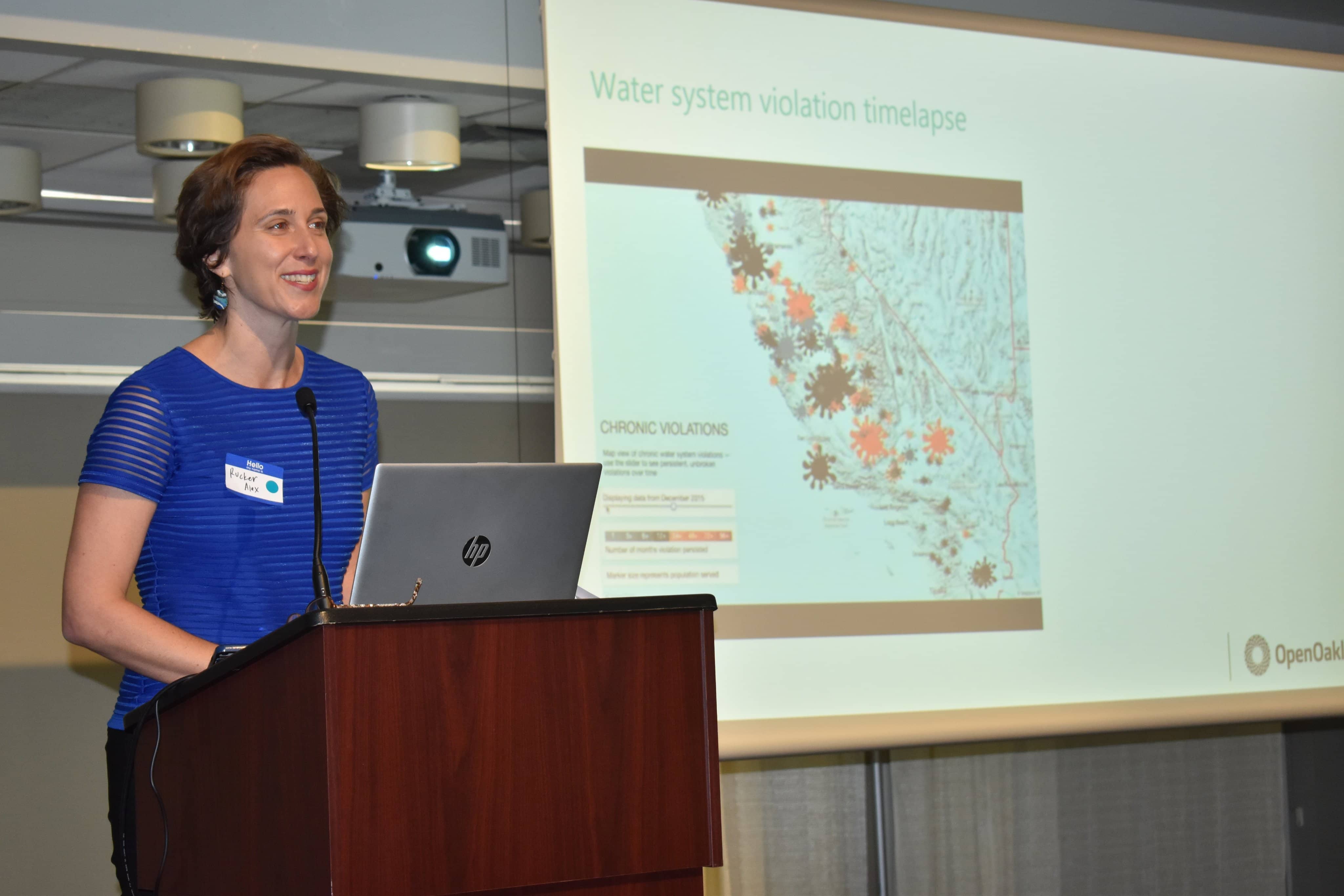
Rucker Alex presenting at the 2019 CA Water Data Challenge event in Sacramento
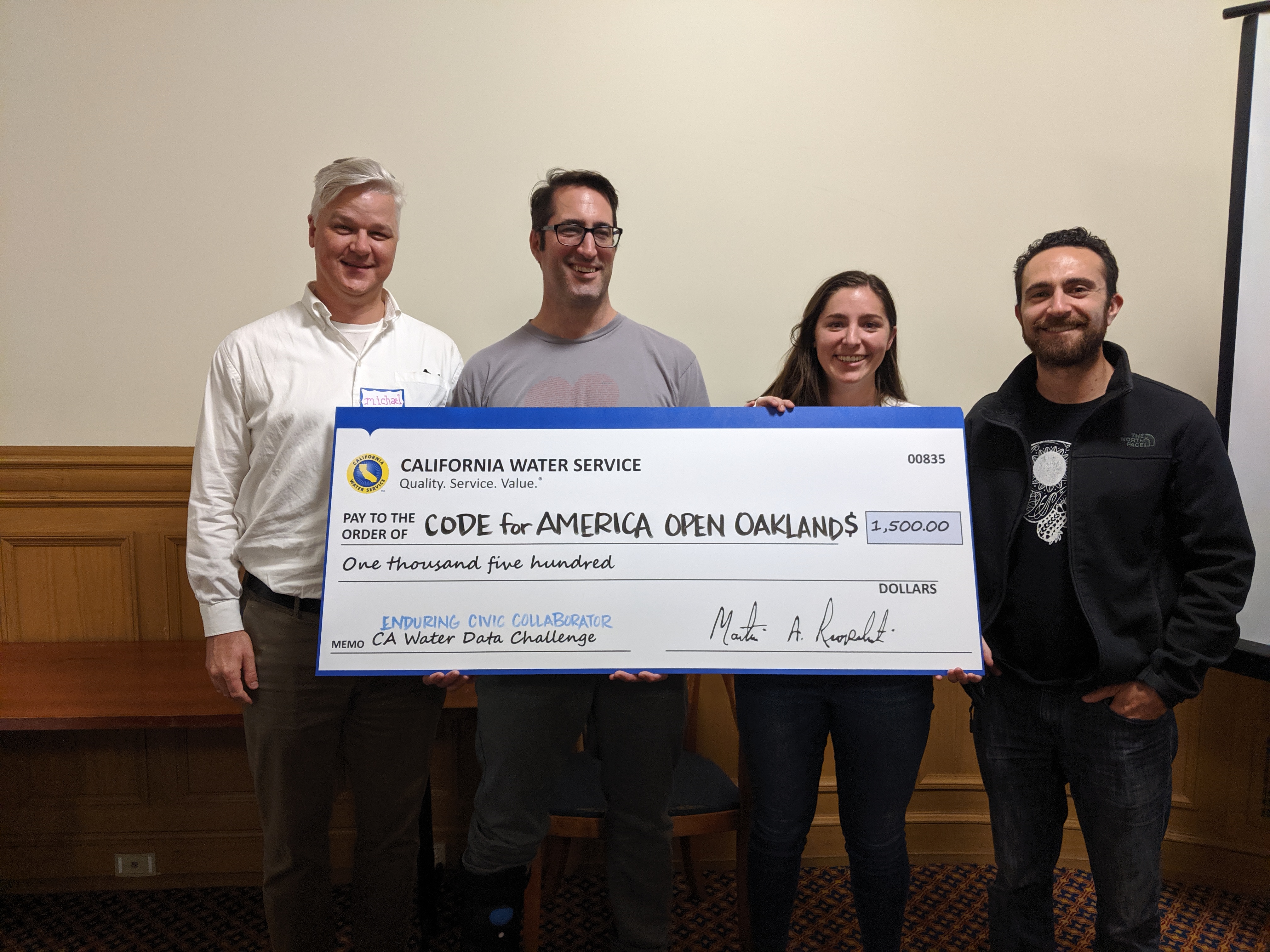
Michael Norelli, Aaron Hans, Cori Gaul and Alex Aruj holding the 2019 prize check
We started this project in 2018 and at the 2018 CA Water Data Challenge where we won the most engaging by design award.
Presentation from 2018 narrated by data scientist Robert Gibboni
